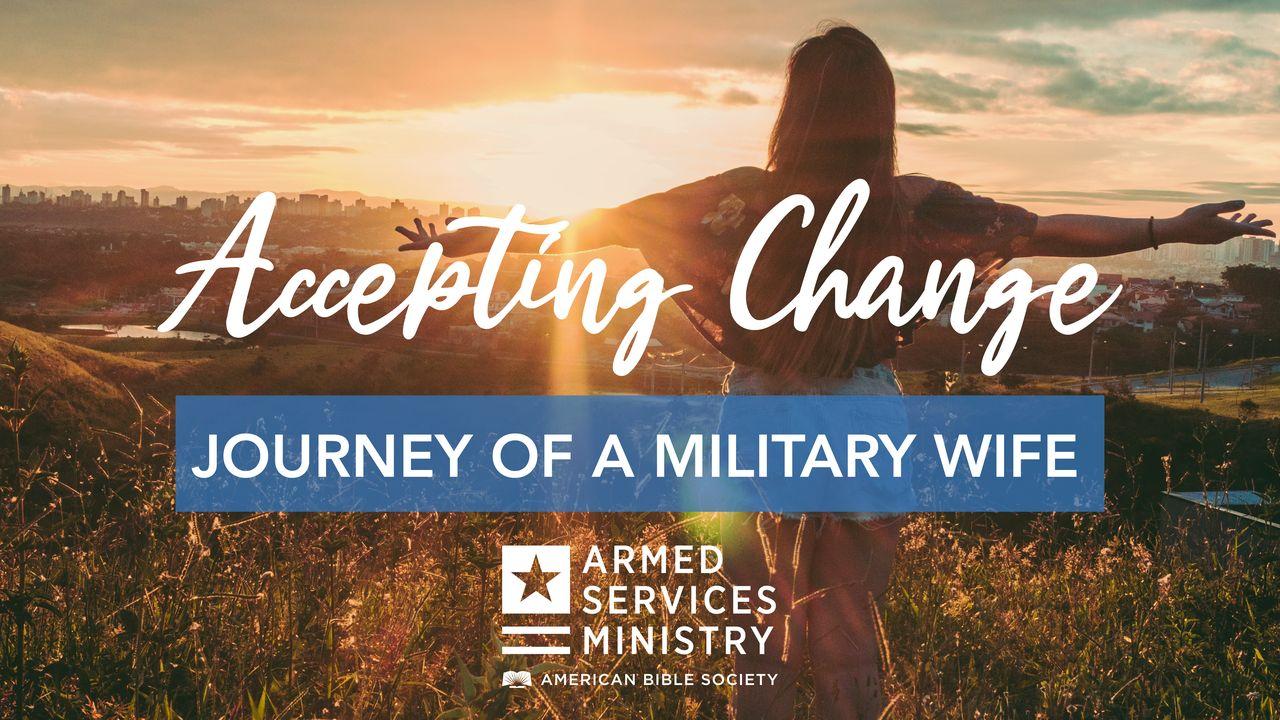Accepting ChangeSample

WHEN I CANNOT SEE YOU
Read
Now Naomi had a relative of her husband’s, a worthy man of the clan of Elimelech, whose name was Boaz. And Ruth the Moabite said to Naomi, “Let me go to the field and glean among the ears of grain after him in whose sight I shall find favor.” And she said to her, “Go, my daughter.” So she set out and went and gleaned in the field after the reapers, and she happened to come to the part of the field belonging to Boaz, who was of the clan of Elimelech.
-Ruth 2:1-3
Reflect
Where is God in this situation? Why is this happening to me? These common questions push their way through the lips of those experiencing tough situations. Whether attributed to the military or a personal crisis common to anyone, such questions are an honest expression of despair and indicate that life from this point will be different.
Life for Naomi and Ruth certainly took a different turn. Their unwanted status as widows flipped Naomi and Ruth’s place in society upside down. In a patriarchal culture, they lost their identity and security. A wife who hears her husband say he wants a divorce, or a woman who loses her child can feel this same sense of loss. Life as we know it can change in a moment. We look around and ask, “God, where are you? Why is this happening to me?”
Sister, can I tell you God is there, even when you do not see him? Naomi and Ruth discovered God’s presence when they were trying to find a way to survive. Ruth did what she had to do to put bread on the table. Gleaning in the field was her culture’s method of food stamp distribution. Hebrew law allowed the poor to gather the leftover grain after the harvest. God established the principle to provide for the poor (Deuteronomy 24:19–21). No doubt Ruth was among other poor folks in the community looking for the bits of grain left behind.
Scripture uses an interesting phrase to describe the scene. Ruth “happened to come upon the field” of a distant wealthy relative (Ruth 2:3). Before we jump to the end of the story, we need to pause and note that the concept of fate, luck, or chance cannot be read into this verse; that is not the Old Testament view of God’s sovereignty. The writer of Ruth emphasized that the human initiative of Ruth or Boaz did not orchestrate this event. Rather, the hand of God was working behind the scenes.
Not only do we see the hand of God directing Ruth to the right field, but God also put compassion and concern into the heart of Boaz for the young Moabite woman who had made it her responsibility to care for her mother-in-law. When Naomi learned where Ruth had been and heard the favor that she received from Boaz, it gave her a spark of hope to think that God’s invisible hand was working on their behalf.
Respond
How does Matthew 28:20b answer the question, “Where is God in this situation?” How do James 1:2–4 and 1 Corinthians 13:9–10, 12 give you hope when you find yourself asking the question, “Why is this happening to me?”
Prayer
Lord, remind me you are always at work even when I do not recognize your actions. Give me a determined mind and heart to trust you and rest in the promise of your care. Amen.
About this Plan

In the midst of a transition, the journey between change and acceptance can feel long. We may get stuck in the struggle of waiting, as our spirits beg for the dust of our transition to settle. But God is in your changes and has worked out the details of your life perfectly. In this plan, you’ll learn that accepting God’s timing and ways brings the peace and reassurance you need.
More
We would like to thank ABS Armed Services Ministry for providing this plan. For more information, please visit: https://militaryjourneys.com/









